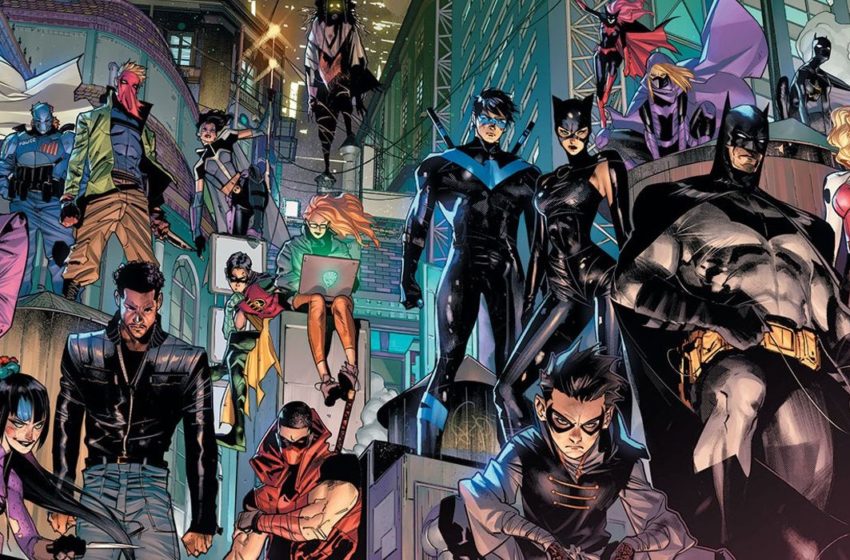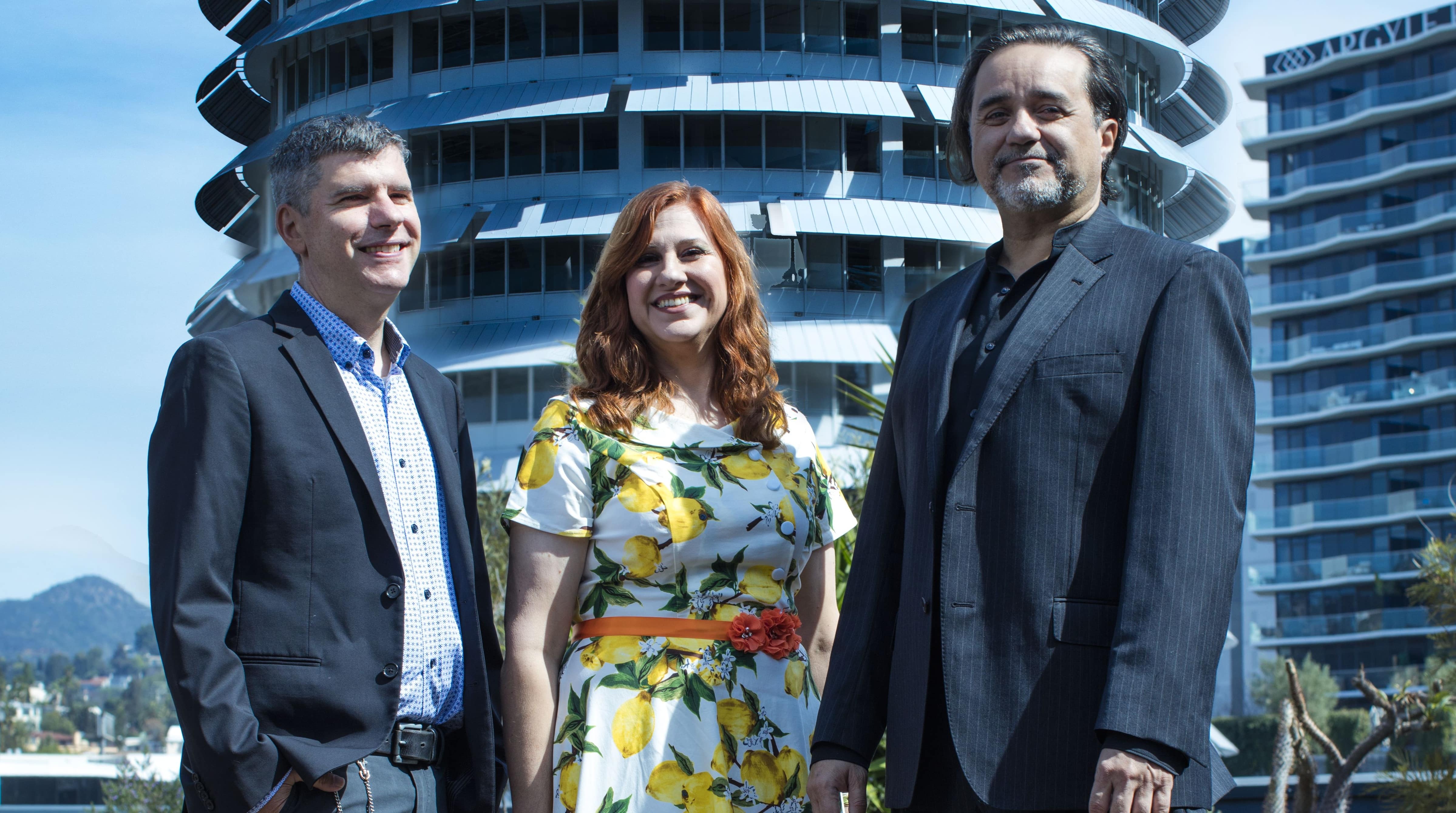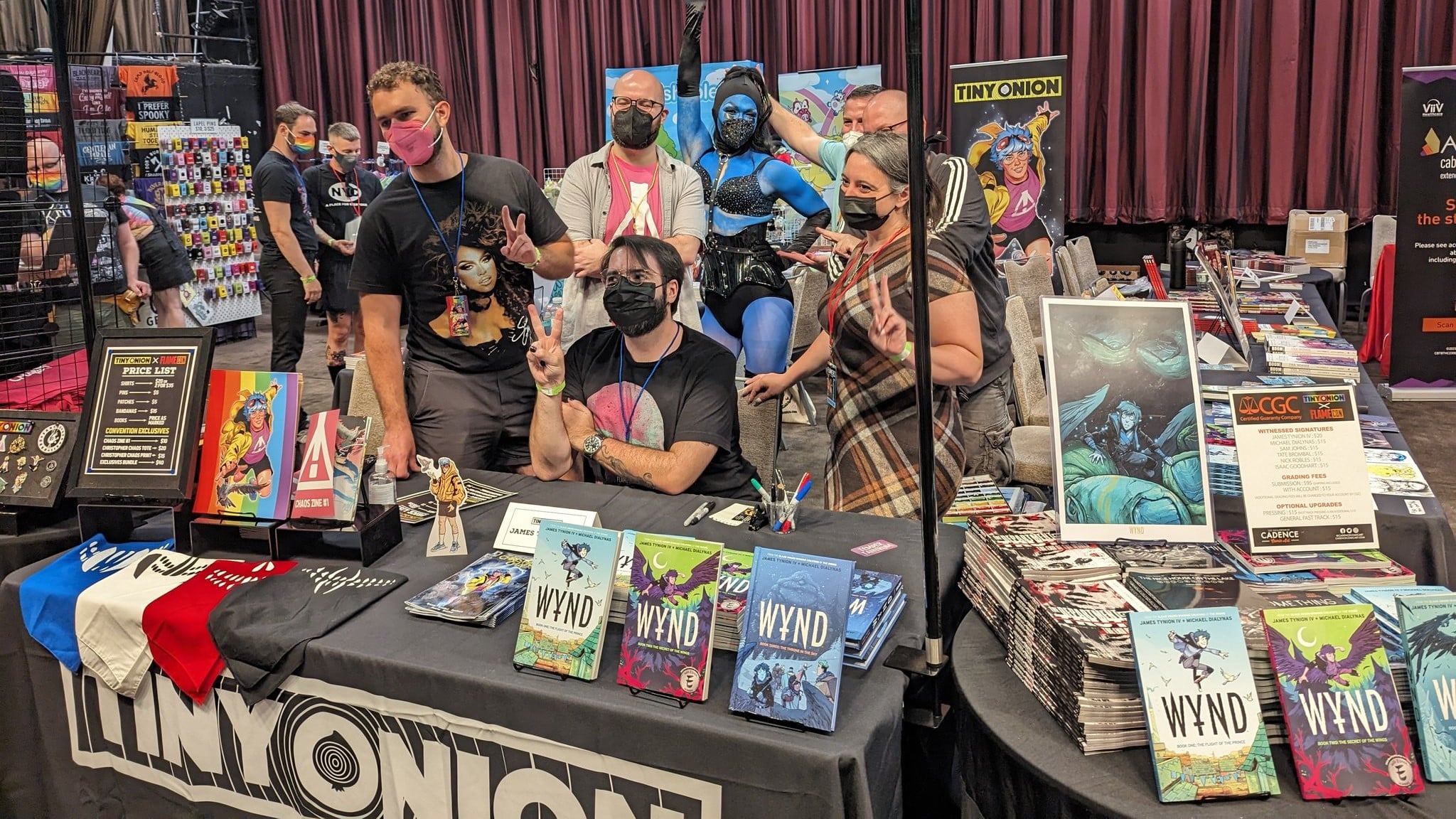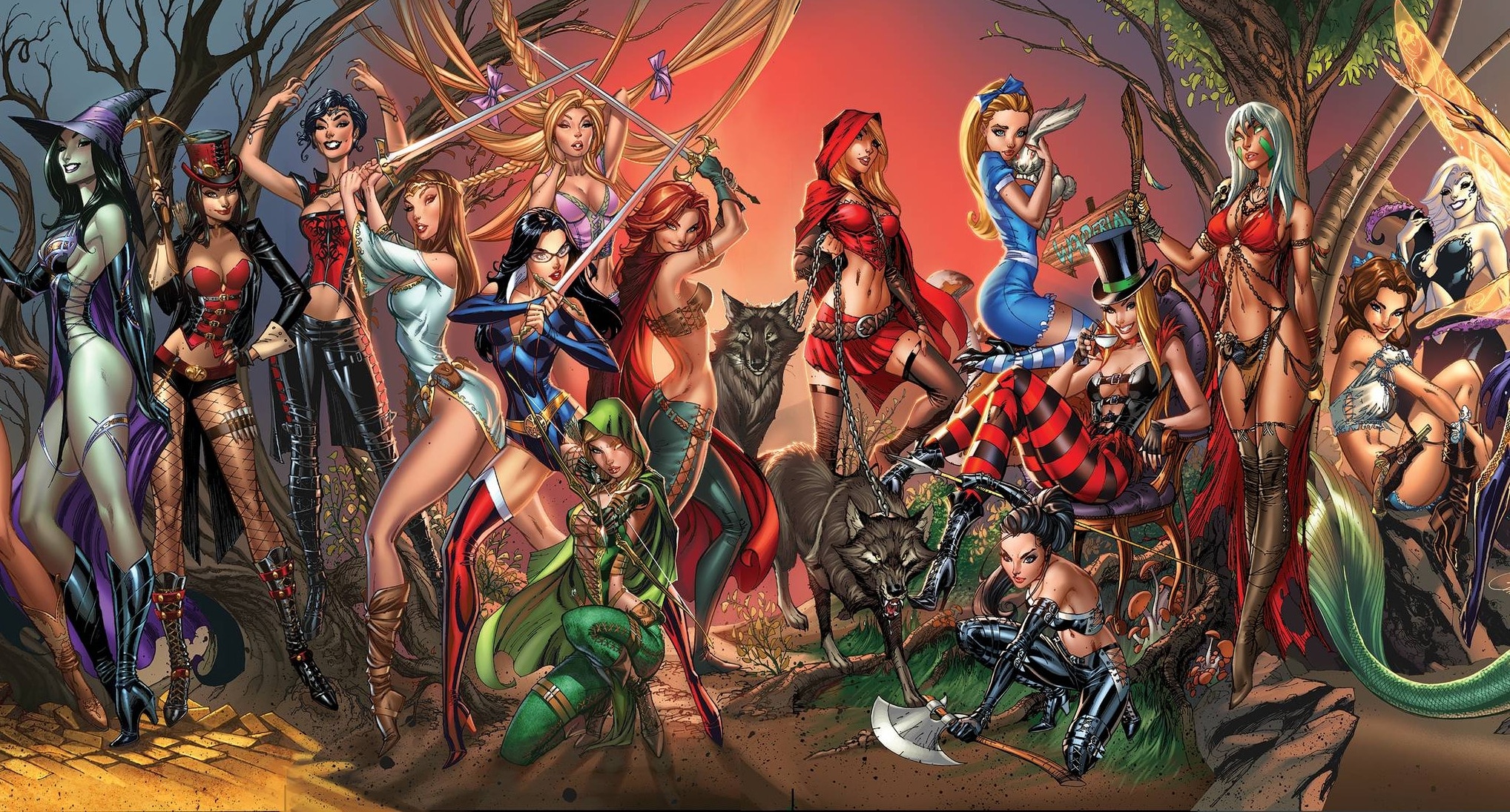James Tynion IV has risen to the top of the industry with acclaimed creator owned books like Department Of Truth, fascinating anthology projects like Razorblades, and also Batman, the book about Batman. He sat down with ComicsXF to give his thoughts on the state of the comics industry and how creators can get their stories told.
Zachary Jenkins: You are published all over the place with Batman at DC, which is a pretty, pretty big deal from what I’m told, Something Is Killing The Children and WYND over at Boom!, Department of Truth at Image, Razorblades through Tiny Onion and the upcoming The Nice House On The Lake, which is a creator owned series that you’re running through DC’s Black Label. That’s a lot of publishers with different strategies. Through fully self-funded at Image to your own studio Tiny Onion, through the AT&T corporation. How well suited is that diverse publishing landscape today to helping creators like yourself tell the stories that you wanna tell?
James Tynion IV: See, I really like how you phrase that question, because the way you phrase it is very important to the question at hand, because honestly, I don’t know how much of the landscape actually helps. I like to figure out how things work. I’m a curious guy. I’ve been working in comics for about 10 years now and one of the benefits of that and having a few successful series under my belt is wanting to make more steps where I can control more of the process, and I don’t have to give up the core intellectual rights of the series that I’m doing.
I am in a very privileged position to be able to do that. It’s something where, to be perfectly honest, I would not be able to bankroll a project like Razorblades at the same time as putting together the upfront costs for a series like Department of Truth without the bank role of Batman at my back. That’s something that changes and it’s something that I wanna build on. I wanted to see how each of these systems played off of each other.
One big thing that bothers me a little bit about how the direct market side of the comics industry has worked for the last couple of decades, and I think there are some signs that this may be changing, is the fact that I think there are a lot of publishers out there whose core business model isn’t actually selling comic books. When the core business model isn’t actually selling comic books, and all of the benefits that creators received are contingent on how many comic books you sell, that’s why creators have to work at a bunch of mid-tier publishers to sort of add all of that up to equal a living wage and that sucks. It means that you have to spread yourself thin. I am someone who likes working a lot. My brain likes doing a bunch of different things, and I like doing a bunch of disparate things at once because I can sort of shift gears in between each of them, but I think that is the underlying philosophy is a lot of it is me.

Now that I’ve reached a point in my career that I can make moves. The benefit of writing a generally successful Batman run and having a few hit indie Series means that I can make the moves with publishers that I wanna make and that I want to understand what each of those moves means and what each of the benefits of those moves are. The three different companies that I’m doing creator owned with have differently structured, creator deals. The books that I’m doing it at Boom!, I’m working with Eric Harburn, who’s been one of my editors since the start of my career and who I think is one of the best editors I’ve ever worked with in my career. And then at DC Black Label, that’s now run by Chris Conroy, who’s my favorite editor I’ve ever worked with at DC. So it’s one of those things where it’s also the people who bring me there.
ZJ: With some of those challenges in the direct market specifically, what could you see as a big improvement for publishers moving forward to make it easier for creators like yourself, or creators who are more up and coming, to tell those stories that they want to be pushing?
JTIV: I think there need to be younger people in decision-making positions. That is one of the most important things. Some of the tastes of the, even at the mid-tier publishers, are shaped by the sort of things that sold 10 years ago, which feels very recent, but actually isn’t all that recent in terms of the turnover of comic readers. Having done this now for a decade I’ve seen us cycle through basically three waves of audiences in that time, and I think there’s actually a new audience that’s picked up in the last year or two. But we cycle through audiences all the time, and you constantly have to shift. Each audience is coming in and asking for a different thing, and I think that we get caught in habit a lot. Oftentimes the young creators who are rising up have a better sense of what the audience actually wants then the people at the publishers.
This is sort of the issue with the current business model. When we are looking at what Hollywood is interested in developing into series, the people in those decision-making positions are also older and the comics that came out ten years ago are still new to them. You’re trying to replicate things from 10 years ago, because they just got to the Hollywood people.
It’s lowering the age of the gatekeepers of the industry. I think that’s really important to keep the audience of the comic book medium. You want to take people who are doing the raw work of their early career, even when their craft might not be where it’s gonna be like five, ten years down the road, but you don’t wanna start pigeon-holing them before they can fully explore all of the potential that of what their work can be.
ZJ: In a recent newsletter you mentioned “We need to be in the business of creating exciting superheroes and villains that fans want to draw in their notebooks, and dress up as, and daydream about…” This is a concept that since back around the Image exodus in the early 90s, that a lot of creators have been very hesitant to do, preferring to save that kind of IP and those concepts for their creator-owned work. Do you think that the market dynamics of today have lessened the value of saving that stuff for other work, or have the agreements from the larger publishers become more attractive for creators to bring some of those ideas to them?
JTIV: I don’t think it’s necessarily that they’ve become more attractive, but I do think that oftentimes, and not always, the characters that you create for the Big Two [Ed. note: Marvel & DC] interact in this larger superhero universe. I think that’s necessary to keep those superhero universes feeling contemporary and vibrant. I genuinely believe that we made a misstep in the early 2000s by going back to a bunch of classic iterations of characters. I think that was to appeal to an existing fan base rather than expanding the fan base and trying to adapt with the times. That may have been necessary in the moment, given the shaky ground that the Direct Market was on, but it is one of those things where it was an aggressive move that I think led to a bunch of doors opening for the book market and the manga market to basically steal the entire young reading population of the country and leaving superheroes to a much more insular group.

The biggest characters at both companies are some of the most recent creations, and by recent, I mean 30 years. Harley Quinn at DC who’s headlining multiple books at the publisher, across their YA line and all of this, headlining multiple movies, headlining an animated series. Over at Marvel you have Deadpool. You see these characters that sort of took a while necessarily to gestate and break out of just being in the comics community, but now they were being found and celebrated across many media and that’s really exciting. If you stop creating new things, then that process never gets kick-started again.
I think the idea of saving all of your super creations for your own IP, there’s an argument there, and I might be totally wrong. Part of the strength of Deadpool is some of the underlying connections to the mythology of Wolverine and the Weapon X Project and the kind of tangential connection to all things mutants in the Marvel Universe. That’s part of what I’ve been trying to guide how I create new characters at DC. I’m trying to fill holes that I see that are open, but Clownhunter is a character that can only exist in a world where there are a bunch of murder clowns running around. Punchline only exists in a world where Joker has been a character for many, many years. We have to take the opportunities that only exist in superhero comics and then you create something new to fill the gap there that helps connect dots and continuity that then open those pieces of continuity to readers. It’s a good business for the companies themselves, because if you use a new character to connect dots between old stories, then that makes the current readers who have never read those old stories, I wanna read those old stories.
DC’s incredible strength for years is its trade paperback backlist, and in the New 52 era, the more of those stories that fell out of continuity, the less of a drive there was for new readers to go back and check them out. Now that DC Infinite is out there, a bunch of young readers get a subscription to that from their parents for Christmas, and that’s their outlet to the entire world. They want to deep dive, they want to go down all of the rabbit holes and see where stories were set up and understand how they all connect together. This is at the end of the day a nerd hobby. Nerds, at least speaking for myself, like to know how all the pieces connect. I like to know how the stories fit together, and then I like to find like, ‘Oh, where’s the hole in this mythology?’ and then I start wondering what might fit in that hole, and then ten, twenty years later, that person’s a comic book writer. All of those things are important parts of the cycle.
But if I had an idea for a totally brand new superhero that wasn’t built in the mythology of any of the other characters,that didn’t necessitate being set in the Marvel or DC Universe? I don’t think I would take that character to Marvel or DC.
ZJ: Speaking of things that you aren’t taking to Marvel or DC, Razorblades started just under a year ago at this point, it’s a quarterly horror anthology released as both a pay what-you-want digital product and a prestige, high-quality physical release. Now that you’ve been doing this three issues and going strong, how has that model worked for you?

JTIV: It is a lot of work to be perfectly blunt. Coordinating it, pulling it together, and then having to figure out printing and distribution? There are so many headaches there. I have a great creative partner in Steve Foxe, and I work with Jon Jespersen of JJ Comics and Art to help me with distribution. We built a system that I’m very proud of, and that has treated us very well. But at the end of the day, I’m still the one that needs to do a whole bunch of stuff while I’m also writing like six other books, and it’s a lot of work. Honestly, the way that we set things up and we put things together, I think only really made sense in the last year of quarantine, where frankly, I had a lot more time on my hands and I wasn’t going to conventions. This was the thing that I did instead of conventions because it was a good way to get in touch with a bunch of creators who I’m excited about and who I’m friends with and work on a little fun thing together. It’s a great excuse to talk to a bunch of people I really like and sort of have a bunch of thoughts about horror and what things want to be.
It’s created a really good lens for a lot of my reading for last year. Iit became something where, now that I was recruiting for a project, I was able to sit down and dig through a bunch of recent horror comics, a bunch of recent horror illustrations, and just sit with it and process. Is this what I’m trying to do with Razorblades? Is this what we’re trying to build here? On top of that, there’s just the incredible value of everything, it just taught me about the distribution process and how to build the system like this again.
Razorblades is a project that will evolve. Once we’re done with this first cycle, through issue 5 this summer, we’re going to pause. We are already making the plans for what happens on the other end of that pause. Because it is something that I want to continue existing because, once again, I don’t think there are enough platforms in this industry that just sort of give creators full ownership of what they’re doing and help connect the dots between all of these different corners of the industry that are more related than a bunch of people think. While I have the spotlight of Batman on me, I want to do that.
If only five out of one-hundred readers is someone who is going to be intrigued enough to go pick up Razorblades, but then Razorblades introduces them to an entire world of creator-owned horror and artists and people that they can follow on social and all of this stuff and start them down the slow radicalization into a full-time comics aficionado beyond just the Big 2. That is the best way I can use my platform as, and some of the profits of being, the writer of Batman. I’ll say it has not been a profitable endeavor, I haven’t lost any money on it, but this is something that I want to exist and I am happy to pay up front to exist. It was just fun, and I think there are a bunch of really, really good comics that happen inside of it, and I also just want to show other people who were near my level or are looking to get to where I’ve gotten in the comics industry and just be like, “Hey, once you get there, instead of doing that one extra Big 2 book, spend some money and make something really fucking weird and cool”. That’s part of the fun! Once you get to the top, make cool stuff. Make cool stuff and put it into the world, that is really the driving idea here.
ZJ: Looking at some of the cool stuff that you are making or about to make, you’ve talked in the past about wanting more ownership over your work, not having all of your eggs in one basket. With that in mind, as the guy who writes Batman, what made DC Black Label the right fit for The Nice House On The Lake.

JTIV: There are a few different angles to it. I knew I wanted to gear up on this series because it was something that I was passionate about, I knew I wanted it to be my next book, and I knew I wanted to do it with Álvaro Martínez. Both of us had signed exclusive contracts with DC so if we wanted to start working on this we would have to wait two years or we need to do it with DC. But I also can’t overstate the presence of Chris Conroy, who was our editor on Detective Comics, Batman Eternal, Batman & Robin Eternal. The familiarity of the team there and knowing that we have that kind of short hand together, it made it something that I was really eager and interested to explore.
Frankly, I was also curious. Given the success of DC Black Label in comic shops over the last few years, I think that there is an opportunity for a robust creator owned title in that space, and it’s something that I think would be good for DC because a good current creator owned title coming out of DC, helps sell DC’s full back list of create our own titles. In the latter days of Vertigo, it kind of landed without a major hit out of the Vertigo stable since probably American Vampire and Sweet Tooth.
I was very curious of how, while I am writing the biggest book in the core DC line, if I do a creator owned with that publisher can they harness that? Does that translate? And to be honest, I don’t know. We are gonna find out and I’m very, very interested. I can’t go into the details of the deal itself, but the deal was also a very good deal that I thought was very fair, and one that I signed without any hesitation.
ZJ: Last question here. You went to Marquette High School over in Milwaukee. What was it like going to high school with my buddy Joe?
JTIV: Oh my God. Small fucking world. Tell Joe hi from me.
I had a great time with the Marquette , I’m still really good friends with, it’s a bunch of people I went to school with there, and some of those friends are the inspiration for characters that are gonna be in The Nice House On The Lake.
ZJ: I read the description for that, knowing your background, I was like, I got a feeling that this is pulling a bit from personal experience.
JTIV: One of my favorite tricks is I just make myself the bad guy of all of my creator-owned books, and I enjoy doing it, and it probably doesn’t say some good things about me, but I think it makes for some compelling comic.
Zachary Jenkins co-hosts the podcast Battle of the Atom and is the former editor-in-chief of ComicsXF. Shocking everyone, he has a full and vibrant life outside all this.






